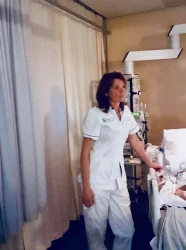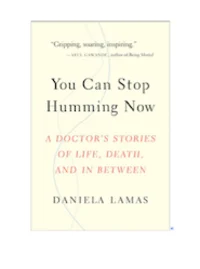We received a MET call (Medical Emergency Team) from the general ward to immediately come and assist. The patient's name was Mr. 'Stevens'. He was 81 and was in our hospital due to severe exacerbations of chronic obstructive pulmonary disease (COPD). He was in acute respiratory distress and had low blood pressure. There was no time to discuss whether he should come to the intensive care unit or not. Mr Stevens had never discussed this before with his doctor, nor with his sons, and in this moment of distress, it was now an option for him. The only thing that was clear was that he wanted to be relieved of his shortness of breath, his pain and his anxiety. There was no chance to talk about the consequences of the decision to enter intensive care. The urgency of the situation forced him to just accept it.
However, in his eyes you could see that he had much to say... there were words that he couldn't get out, things he wasn't able to say when he arrived. We all knew this when we saw him coming in to our unit. We could see the emotion, bubbling under the surface, all the feelings he wanted to express, but couldn't any longer, simply restrained by his utter weakness in the final hours of his life.
I'm an intensive care nurse... Part of this job is intuitive. You just know when it isn’t going to work out well; almost immediately, often after having overlooking the situation, you get the feeling... The gnawing sense that all will not be fine. But it's life in the fast lane, and you must push forward, and just do what you think is the best for the patient. With each and every patient, no matter what intuition tells me, I always say "I'm going to take good care of you, we will all do our best to help you". These words never come out automatically, I always say them with full awareness of the fact that it is a life-threatening situation, while in my mind I think: "I hope you can make it, or get some much-needed rest".
For many of these patients, like Mr. Stevens, the ICU serves as a final destination after a long period of suffering. I think Mr. Stevens must have recognised this, and had the same thoughts.... In the ICU, the doctors examined and investigated Mr. Stevens very carefully, in a clinically efficient way, trying to fix him in a very short time. The nurses put him on the noninvasive ventilator, in an attempt to get him back on track, with the hopes that it would not be necessary to intubate him.
His situation slightly improved for a while, so he was able to see his two sons. No one spoke during the visit - neither he nor his sons. It was obvious though, that he was saying goodbye with his eyes. The sons stood at the foot of his bed, somewhat at a distance, as if they didn't know what to say, or what to do, or how to react. I tried to encourage his sons to move near him, but sometimes you must just leave people be. Often you would have loved to see families openly hugging their loved ones and sharing their feelings, but you can’t force that.
This was the moment that my colleague went to sit on his bed, and Mr. Stevens immediately turned to her, laid his tired body against her. In his anxiety, it seemed as though he was seeking an anchor to rest upon. For half an hour he was calm, but then he began to get confused and restless. That was also the sign for us that he couldn't stand this situation any longer. The doctor asked for the nurses to prepare to intubate him. My colleague held him till he was asleep. This situation touched me deeply and I was grateful to my colleague, that she saw the need and took the time to just sit next to this man.... Whilst everyone else seemed to be in the rush of the moment, she provided calm for the patient by simply speaking softly to him. It was as if they were alone there together, in a separate film-like reality.
Warm feelings for Annette, my colleague who inspired me to write this blog.
However, in his eyes you could see that he had much to say... there were words that he couldn't get out, things he wasn't able to say when he arrived. We all knew this when we saw him coming in to our unit. We could see the emotion, bubbling under the surface, all the feelings he wanted to express, but couldn't any longer, simply restrained by his utter weakness in the final hours of his life.
I'm an intensive care nurse... Part of this job is intuitive. You just know when it isn’t going to work out well; almost immediately, often after having overlooking the situation, you get the feeling... The gnawing sense that all will not be fine. But it's life in the fast lane, and you must push forward, and just do what you think is the best for the patient. With each and every patient, no matter what intuition tells me, I always say "I'm going to take good care of you, we will all do our best to help you". These words never come out automatically, I always say them with full awareness of the fact that it is a life-threatening situation, while in my mind I think: "I hope you can make it, or get some much-needed rest".
"I'm an intensive care nurse... Part of this job is intuitive. You just know when it isn’t going to work out well; almost immediately, often after having overlooking the situation, you get the feeling... The gnawing sense that all will not be fine. But it's life in the fast lane, and you must push forward, and just do what you think is the best for the patient."
For many of these patients, like Mr. Stevens, the ICU serves as a final destination after a long period of suffering. I think Mr. Stevens must have recognised this, and had the same thoughts.... In the ICU, the doctors examined and investigated Mr. Stevens very carefully, in a clinically efficient way, trying to fix him in a very short time. The nurses put him on the noninvasive ventilator, in an attempt to get him back on track, with the hopes that it would not be necessary to intubate him.
His situation slightly improved for a while, so he was able to see his two sons. No one spoke during the visit - neither he nor his sons. It was obvious though, that he was saying goodbye with his eyes. The sons stood at the foot of his bed, somewhat at a distance, as if they didn't know what to say, or what to do, or how to react. I tried to encourage his sons to move near him, but sometimes you must just leave people be. Often you would have loved to see families openly hugging their loved ones and sharing their feelings, but you can’t force that.
This was the moment that my colleague went to sit on his bed, and Mr. Stevens immediately turned to her, laid his tired body against her. In his anxiety, it seemed as though he was seeking an anchor to rest upon. For half an hour he was calm, but then he began to get confused and restless. That was also the sign for us that he couldn't stand this situation any longer. The doctor asked for the nurses to prepare to intubate him. My colleague held him till he was asleep. This situation touched me deeply and I was grateful to my colleague, that she saw the need and took the time to just sit next to this man.... Whilst everyone else seemed to be in the rush of the moment, she provided calm for the patient by simply speaking softly to him. It was as if they were alone there together, in a separate film-like reality.
Warm feelings for Annette, my colleague who inspired me to write this blog.










